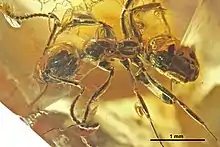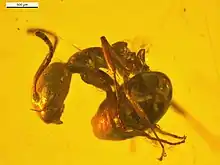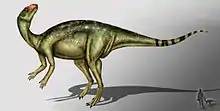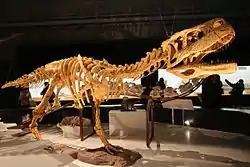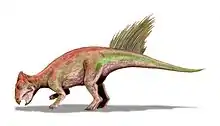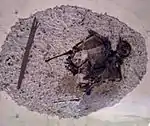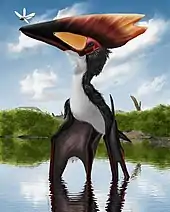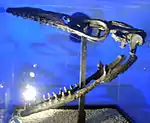2002 in paleontology
Paleontology or palaeontology is the study of prehistoric life forms on Earth through the examination of plant and animal fossils.[1] This includes the study of body fossils, tracks (ichnites), burrows, cast-off parts, fossilised feces (coprolites), palynomorphs and chemical residues. Because humans have encountered fossils for millennia, paleontology has a long history both before and after becoming formalized as a science. This article records significant discoveries and events related to paleontology that occurred or were published in the year 2002.
| |||
|---|---|---|---|
| Wikimedia Commons has media related to 2002 in paleontology. |
Plants
Gymnosperms
| Name | Novelty | Status | Authors | Age | Unit | Location | Notes | Images |
|---|---|---|---|---|---|---|---|---|
|
Sp nov |
Valid |
Mustoe |
McAbee site, Kamloops Group |
|||||
|
Sp nov |
Valid |
McKown, Stockey, & Schweger |
Ch'ijee's Bluff, Bluefish Basin |
|||||
Brachiopods
| Name | Status | Authors | Location | Notes | Images |
|---|---|---|---|---|---|
| Diabolirhynchia | Gen. et sp. nov. | A. Williams | lamp shell |
Arthropods
Insects
| Name | Novelty | Status | Authors | Age | Unit | Location | Notes | Images |
|---|---|---|---|---|---|---|---|---|
|
Sp nov |
valid |
Dlussky |
Middle Eocene |
Baltic amber |
Fossil Dolichoderine ant |
| ||
|
Sp nov |
valid |
Dlussky |
Middle Eocene |
Baltic amber |
Fossil Dolichoderine ant |
| ||
|
Sp nov. |
valid |
Makarkin, Archibald, Oswald |
A hemerobiid lacewing, a second species of Cretomerobius |
|||||
|
Fibla (Reisserella) cerdanica[8] |
Comb nov |
Valid |
(Nel) |
Late Miocene |
An inocellid snakefly, |
_cerdanica_holotype_MNHN.F.R10418_part_side_direct_lighting.jpg.webp) Fibla cerdanica | ||
|
Formica gustawi[9] |
Sp nov |
valid |
Dlussky |
Middle Eocene |
Baltic amber |
Fossil formicine ant |
 Formica gustawi | |
|
sp. nov |
valid |
Makarkin, Archibald, Oswald |
first description of fossil Wesmaelius |
|||||
Conodonts
Willi Ziegler IA Bardashev and K Weddige described the conodont genus Eolinguipolygnathus.[10]
Archosauromorphs
Newly named dinosaurs
Data courtesy of George Olshevsky's dinosaur genera list.[11]
| Name | Novelty | Status | Authors | Age | Unit | Location | Notes | Images |
|---|---|---|---|---|---|---|---|---|
|
gen et sp nov |
Valid |
Fraser, Padian, Walkden, & Davis |
late Triassic |
A possible chimera |
| |||
|
gen et sp nov |
Valid |
Coria & Calvo |
Late Cretaceous |
An Iguanodont |
| |||
|
gen et sp nov |
Valid |
An Abelisaurid |
| |||||
|
gen nov |
Novacek |
Officially named Byronosaurus |
||||||
|
gen et sp nov |
Valid |
An ankylosaurid |
||||||
|
gen et sp nov |
Czerkas, Zhang, Li, & Li |
Jr synonym of Microraptor |
||||||
|
gen et sp nov |
Zhang, Zhou, Xu, & Wang |
jr synonym of Scansoriopteryx |
||||||
|
gen et sp nov |
Valid |
Xu et al. |
| |||||
|
gen et sp nov |
Hutt |
Jr synonym of Eotyrannus |
||||||
|
Rey |
Officially named Huaxiagnathus in 2004 |
|||||||
|
gen et sp nov |
Valid |
Xu, Wang, & Chang |
||||||
|
gen et sp nov |
Valid |
|
| |||||
|
gen et sp nov |
Valid |
Kellner & Campos |
Bauru-type red conglomerate sandstone |
An Abelisaurid |
||||
|
gen et sp nov |
Valid |
Czerkas & Yuan |
Possible junior synonym of Epidendrosaurus |
|||||
|
gen et sp nov |
Valid |
Xu et al. |
||||||
Newly named birds
| Name | Status | Novelty | Authors | Age | Unit | Location | Notes | Images |
|---|---|---|---|---|---|---|---|---|
|
Adelalopus hoogbutseliensis [26] |
Valid |
Gen. nov. et Sp. nov. |
Richard Smith |
Early Oligocene |
A Phoenicopteriformes, Palaelodidae Stejneger, 1885. This is the type species of the new genus. |
|||
|
Aegialornis germanicus [27] |
Valid |
Sp. nov. |
Jirí Mlíkovský |
Middle Eocene |
An Apodiformes, Aegialornithidae Lydekker, 1891. |
|||
|
Archaeotrogon nocturnus [27] |
Valid |
Sp. nov. |
Jirí Mlíkovský |
Phosphorites du Quercy, MP 16-28 |
An Apodiformes, Archaeotrogonidae Mourer-Chauviré, 1980. |
|||
|
Athene trinacriae [28] |
Valid |
Gen. nov. et Sp. nov. |
Marco Pavia |
A Strigidae. |
||||
|
Belonopterus downsi [29] |
Valid |
Sp. nov. |
Kenneth E. Campbell, Jr. |
Late Pleistocene |
|
A Charadriidae. |
||
|
Camusia quintanai [30] |
Valid |
Gen. nov. et Sp. nov. |
Bartomeu Seguí |
Vroeg-Midden Plioceen |
MN 15-16 |
A Gruidae. |
||
|
Valid |
Sp. nov. |
Hou Lianhai Zhang F. Gu Y. |
A Cathayornithidae Zhou, Jin et Zhang, 1992. |
|||||
|
Valid |
Sp. nov. |
Sylvia Hope |
|
A Cimolopterygidae Brodkorb, 1963, transferred to the new genus Lamarqueavis Agnolin, 2010 by Federico Agnolin in 2010.[33] |
||||
|
Collocalia manuoi [34] |
Valid |
Sp. nov. |
An Apodidae. |
|||||
|
Colymboides belgicus [26] |
Valid |
Sp. nov. |
Richard Smith |
Early Oligocene |
A Gaviidae. |
|||
|
Delphinornis arctowskii [35] |
Valid |
Sp. nov. |
Andrzej Myrcha Pjotr Jadwiszczak Claudia P. Tambussi Jorge I. Noriega Andrzej Gazdzicki Andrzej Tatur Rodolpho A. Del Valle |
A Spheniscidae. |
||||
|
Delphinornis gracilis [35] |
Valid |
Sp. nov. |
Andrzej Myrcha Pjotr Jadwiszczak Claudia P. Tambussi Jorge I. Noriega Andrzej Gazdzicki Andrzej Tatur Rodolpho A. Del Valle |
A Spheniscidae. |
||||
|
Valid |
Sp. nov. |
Larry D. Martin |
|
An Hesperornithiformes Fürbringer, 1888, Enaliornithidae Fürbringer, 1888. |
||||
|
Valid |
Gen. nov. et Sp. nov. |
An Enantiornithes Walker, 1981. |
||||||
|
Giganhinga kiyuensis [38] |
Valid |
Gen. nov. et Sp. nov. |
Andrés Rinderknecht Jorge I. Noriega |
San José Formation |
An Anhingidae. |
|||
|
Gigantohierax suarezi [39] |
Valid |
Sp. nov. |
Cave deposits |
An Accipitridae. |
||||
|
Valid |
Gen. nov. et Sp. nov. |
James P. Lamb Per G. P. Ericson |
Early-Middle Campanian, |
|
An Enantiornithes Walker, 1981, Euenantiornithes Chiappe, 2002. |
|||
|
Hesperornis bairdi [41] |
Valid |
Sp. nov. |
Larry D. Martin Jong-Deock Lim |
|
A Hesperornithidae Marsh, 1872. |
|||
|
Hesperornis chowi [41] |
Valid |
Sp. nov. |
Larry D. Martin Jong-Deock Lim |
|
A Hesperornithidae Marsh, 1872. |
|||
|
Hesperornis macdonaldi [41] |
Valid |
Sp. nov. |
Larry D. Martin Jong-Deock Lim |
|
A Hesperornithidae Marsh, 1872. |
|||
|
Hesperornis mengeli [41] |
Valid |
Sp. nov. |
Larry D. Martin Jong-Deock Lim |
A Hesperornithidae Marsh, 1872. |
||||
|
?Idiornis anthracinus [42] |
Valid |
Sp. nov. |
Middle Eocene |
An Idiornithidae Brodkorb, 1965. The genus Idiornis Oberholser, 1899 is placed in synonymy with Dynamopterus Milne-Edwards, 1892 by Mourer-Chauviré, 2013 [43] |
||||
|
Valid |
Gen. nov. et Sp. nov. |
Zhang Fucheng |
A Jeholornithidae Zhou et Zhang, 2006. |
|||||
|
Jiliniornis huadianensis [45] |
Valid |
Gen. nov. et Sp. nov. |
Hou Lianhai Per G. P. Ericson |
Middle Eocene |
A Charadriidae. |
|||
|
Valid ? |
Gen. nov. et Sp. nov. |
Hou Lianhai Zhang F. Gu Y. |
A Confuciusornithidae L. H. Hou, Zhou, Gu et Zhang, 1995. This is the type species of the new genus. Possibly a synonym of Confuciusornis sanctus Hou, Zhou, Gu et Zhang, 1995. |
|||||
|
Valid ? |
Sp. nov. |
Hou Lianhai Zhang F. Gu Y. |
A Confuciusornithidae L. H. Hou, Zhou, Gu et Zhang, 1995. Possibly a synonym of Confuciusornis sanctus Hou, Zhou, Gu et Zhang, 1995. |
|||||
|
Valid |
Gen. nov. et Sp. nov. |
Ji Qiang Ji Shuan Zhang Hongbin You Hailu Zhang Jianping Wang Lixia Yuan Chongxi Ji Xinxin |
An Avialae Gauthier, 1986. |
|||||
|
Valid |
Sp. nov. |
Subrecent |
A Laridae. |
|||||
|
Marambiornis exilis [35] |
Valid |
Gen. nov. et Sp. nov. |
Andrzej Myrcha Pjotr Jadwiszczak Claudia P. Tambussi Jorge I. Noriega Andrzej Gazdzicki Andrzej Tatur Rodolpho A. Del Valle |
A Spheniscidae. |
||||
|
Valid |
Gen. nov. et Sp. nov. |
Early Middle Eocene |
A Sulidae. |
|||||
|
Mesetaornis polaris [35] |
Valid |
Gen. nov. et Sp. nov. |
Andrzej Myrcha Pjotr Jadwiszczak Claudia P. Tambussi Jorge I. Noriega Andrzej Gazdzicki Andrzej Tatur Rodolpho A. Del Valle |
A Spheniscidae. |
||||
|
Miodytes serbicus [49] |
Valid |
Gen. nov. et Sp. nov. |
Vesna Dimitreijevich Erika Gál Eugen Kessler |
Early Miocene |
Valjevo Basin |
|||
|
Valid |
Gen nov. et Sp. nov. |
David C. Parris Sylvia Hope |
Late Cretaceous |
Latest Maastrichtian or Earliest Danian, Hornerstown Formations |
|
A ?Torotigidae Brodkorb, 1963. |
||
|
Oligosylphe mourerchauvireae [26] |
Valid |
Gen. nov. et Sp. nov. |
Richard Smith |
Early Oligocene |
A Piciformes, Sylphornithidae Mourer-Chauviré, 1988. |
|||
|
Valid |
Gen. nov. et Sp. nov. |
Stephen A. Czerkas |
Jiufutang Formation |
An Omvivoropterygidae Czerkas and Qiang Ji, 2002. |
||||
|
Oxyura doksana [27] |
Valid |
Sp. nov. |
Jirí Mlíkovský |
Early Miocene |
MN 4b |
An Anatidae. |
||
|
Paraortygoides radagasti [52] |
Valid |
Sp. nov. |
Bonnie E. Gulas |
Early Eocene |
|
A Gallinuloididae Lucas, 1900. |
||
|
Parasarcoramphus milneedwardsi [53] |
Valid |
Gen. nov. et Sp. nov. |
A Cathartidae. |
|||||
|
Plesiocathartes geiselensis [54] |
Valid |
Sp. nov. |
Middle Eocene |
A Leptosomidae. |
||||
|
Plesiocathartes kelleri [55] |
Valid |
Sp. nov. |
Middle Eocene |
A ?Leptosomidae. |
||||
|
Valid |
Gen. nov. et Sp. nov. |
A Gaviidae, this is the type species of the new genus. |
||||||
|
Valid |
Gen. nov. et Sp. nov. |
Zhang Fucheng |
A Sapeornithidae Zhou, 2006. This is the type species of the new genus. |
|||||
|
Septentrogon madseni [58] |
Valid |
Gen. nov. et Sp. nov. |
Anette V. Kristoffersen |
A Trogonidae. This is the type species of the new genus. |
||||
|
Valid |
Gen. nov. et Sp. nov. |
Ji Qiang Ji Shuan You Hailu Yuan Chonxi Ji Xinxin Li Jinglu Li Yinzian |
An Avialae. This is the type species of the new genus. When you enter "Discovery of an Avialae Bird from China, Shenzhouraptor sinensis gen. et sp. nov." in google you get the pdf. |
|||||
|
Valid |
Sp. nov. |
Marcello Stucchi |
A Spheniscidae. |
|||||
|
Valid |
Gen. nov. et Sp. nov. |
Tremembé Formation |
A Teratornithidae Miller, 1909, this is the type species of the new genus. |
|||||
|
Valid |
Sp. nov. |
Cave deposits |
A Teratornithidae Miller, 1909. Transferred to the new genus Oscaravis Suárez et Olson, 2009. by William Suárez Duque & Storrs Lovejoy Olson, they made it the type species of the new genus.[63] |
|||||
|
Valid |
Sp. nov. |
Kenneth E. Campbell Alison T. Stenger |
Late Pleistocene |
± -12.760-12.050 BP |
|
A Teratornithidae Miller, 1909. If you search "A New Teratorn (Aves: Teratornithidae) from the Upper Pleistocene of Oregon" on google, you find the pdf |
||
|
Valid |
Gen. nov. et Sp. nov. |
Alexandr A. Karhu |
A Presbyornithidae Wetmore, 1926. This is the type species of the new genus. |
|||||
|
Tyto cyrneichnusae [66] |
Valid |
Sp. nov. |
Antoine Louchart |
Late Pleistocene |
A Tytonidae. |
|||
Newly named Plesiosaurs
| Name | Status | Authors | Notes |
|---|---|---|---|
|
Valid |
|
||
|
Valid |
|
||
|
Valid |
|
Pterosaurs
In October, a partial Mesadacylus wing was discovered in the Kingsview Quarry of Colorado.[67] This find marks the first time that a Morrison pterosaur has been found at more than one site in the formation.[67]
New taxa
| Name | Novelty | Status | Authors | Age | Unit | Location | Notes | Images |
|---|---|---|---|---|---|---|---|---|
|
gen et sp nov |
Valid |
Dalla Vecchia, Wild, & Reitner |
Seefelder Beds |
|||||
|
gen et sp nov |
Valid |
Buffetaut, Grigorescu, & Csiki |
Densuș-Ciula Formation |
possibly a jr synonym of Quetzalcoatlus |
||||
|
gen et sp nov |
Valid |
Wang & Zhou |
| |||||
|
gen et sp nov |
Valid |
Varricchio |
At first thought to be a bird, but subsequently reinterpreted as a pterosaur, likely a member of Ornithocheiroidea.[69] |
|||||
|
gen et sp nov |
Valid |
Czerkas & Ji |
||||||
|
gen et sp nov |
Valid |
Kellner & Campos |
||||||
|
gen et sp nov |
Valid |
Czerkas & Mickelson |
Morrison Formation, Utah |
Lepidosauromorphs
Newly named Squamates
| Name | Novelty | Status | Authors | Age | Unit | Location | Notes | Images |
|---|---|---|---|---|---|---|---|---|
|
Gen et sp nov |
Jr synonym |
Novas et al. |
Genus synonymized in 2007 with Taniwhasaurus |
|
Synapsids
Non-mammalian
| Name | Novelty | Status | Authors | Age | Unit | Location | Notes | Images |
|---|---|---|---|---|---|---|---|---|
|
gen nov |
Valid |
Kammerer & Sidor |
Upper Permian |
A dinocephalian. Replacement name for Criocephalus Broom, 1928, preoccupied by Criocephalus Mulsant 1839. |
||||
|
Gen nov |
Valid |
Maisch |
A dicynodont. New genus for "Platycyclops" crassus Broom, 1948. |
|||||
|
gen et sp nov |
Valid |
Maisch |
Beaufort Group |
A dicynodont. The type species is Kwazulusaurus shakai. |
||||
|
Lanthanocephalus[74] |
gen et sp nov |
Preoccupied |
Modesto, Rubidge, & Welman |
Koonap Formation |
Genus preoccupied by Lanthanocephalus Williams & Starmer, 2000, moved to the replacement Lanthanostegus in 2003 |
|||
|
gen et sp nov |
Valid |
Tatarinov |
Middle Triassic |
A cynodont. The type species is Neotrirachodon expectatus. |
||||
|
gen et sp nov |
Valid |
Maisch |
Kawinga Formation |
A gorgonopsian. The type species is Ruhuhucerberus terror. |
||||
|
gen nov |
Valid |
Maisch |
Kawinga Formation |
A gorgonopsian. New genus for "Gorgonognathus" maximus von Huene, 1950. |
References
- Gini-Newman, Garfield; Graham, Elizabeth (2001). Echoes from the past: world history to the 16th century. Toronto: McGraw-Hill Ryerson Ltd. ISBN 9780070887398. OCLC 46769716.
- Mustoe, G.E. (2002). "Eocene Ginkgo leaf fossils from the Pacific Northwest". Canadian Journal of Botany. 80 (10): 1078–1087. doi:10.1139/b02-097.
- McKown, A.D.; Stockey, R.A.; Schweger, C.E. (2002). "A New Species of Pinus Subgenus Pinus Subsection Contortae From Pliocene Sediments of Ch'ijee's Bluff, Yukon Territory, Canada" (PDF). International Journal of Plant Sciences. 163 (4): 687–697. doi:10.1086/340425. Archived from the original (PDF) on 2008-02-21.
- Poinar, G.; Brown, A. (2002). "Hymenaea mexicana sp. nov. (Leguminosae: Caesalpinioideae) from Mexican amber indicates Old World connections". Botanical Journal of the Linnean Society. 139 (2): 125–132. doi:10.1046/j.1095-8339.2002.00053.x.
- Mohr, B.; Rydin, C. (2002). "Trifurcatia flabellata n. gen. n. sp., a putative monocotyledon angiosperm from the Lower Cretaceous Crato Formation (Brazil)". Fossil Record. 5 (1): 335–344. doi:10.1002/mmng.20020050121.
- Dlussky, G. (2002). "[Ants of the genus Dolichoderus (Hymenoptera: Formicidae) from the Baltic and Rovno ambers.]". Paleontologicheskii Zhurnal (in Russian). 2002 (1): 54–68.
- Makarkin, VN; Archibald, SB; Oswald, JD (2003). "New Early Eocene brown lacewings (Neuroptera: Hemerobiidae) from western North America". The Canadian Entomologist. 135 (5): 637–653. CiteSeerX 10.1.1.489.5852. doi:10.4039/n02-122.
- Nel, A. (1993). "Nouveaux Raphidioptères fossiles du Cénozoïque de France et d'Espagne". École Pratique des Hautes Études, Biologie et Évolution des Insectes. 6: 99–108.
- Dlussky, G. M. (2002). "Syntypes of Baltic amber ants Formica flori Mayr and Ponera atavia Mayr (Hymenoptera: Formicidae)". Russian Entomological Journal. 11: 291–298.
- Bardashev Igor A (2002). "The phylomorphogenesis of some early devonian platform conodonts". Senckenbergiana Lethaea. 82 (2): 375–451. doi:10.1007/BF03042946.
- Olshevsky, George. "Dinogeorge's Dinosaur Genera List". Retrieved 2008-08-07.
- Fraser N.C., Padian K., Walkden G.M., Davis A.L.M. (2002). "Basal dinosauriform remains from Britain and the diagnosis of the Dinosauria". Palaeontology. 45: 79–95. doi:10.1111/1475-4983.00228.CS1 maint: multiple names: authors list (link)
- Coria, R.A.; Calvo, J.O. (2002). "A new iguanodontian ornithopod from Neuquen Basin, Patagonia, Argentina". Journal of Vertebrate Paleontology. 22 (3): 503–509. doi:10.1671/0272-4634(2002)022[0503:aniofn]2.0.co;2.
- Coria R.A.; Chiappe L.M.; Dingus L. (2002). "A new close relative of Carnotaurus sastrei Bonaparte 1985 (Theropoda: Abelisauridae) from the Late Cretaceous of Patagonia". Journal of Vertebrate Paleontology. 22 (2): 460–465. doi:10.1671/0272-4634(2002)022[0460:ANCROC]2.0.CO;2.
- Novacek, M.J. 2002. Time Traveler. In: Search of Dinosaurs and Ancient Mammals from Montana to Mongolia. Farrar, Straus & Giroux. 368 pages.
- Dong Z.-M. (2002). "A new armored dinosaur (Ankylosauria) from Beipaio Basin, Liaoning Province, northeastern China". Vertebrata PalAsiatica. 40 (4): 276–285.
- Czerkas, S.A., D. Zhang, J. Li, and Y. Li. 2002. Flying Dromaeasaurs. In S.J. Czerkas (ed.), Feathered Dinosaurs and the origin of flight. The dinosaur Museum Journal, Volume 1. The Dinosaur Museum of Blanding, Utah.
- Zhang, Fucheng; Zhou, Zhonghe; Xu, Xing; Wang, Xiaolin (2002). "A juvenile coelurosaurian theropod from China indicates arboreal habits". Naturwissenschaften. 89 (9): 394–8. doi:10.1007/s00114-002-0353-8. PMID 12435090.
- Xu X., Zhang X.-H., Sereno P., Zhao X.-J., Xu , Kuang W., Han J., Tan L. (2002). "A new therizionosauroid (Dinosauria, Theropoda) from the Upper Cretaceous Iren Dabau Formation of Nei Mongol". Vertebrate Palasiatica. 40 (3): 228–240.CS1 maint: multiple names: authors list (link)
- Hutt, S. 2002. "Mr Leng's dinosaur." The Geological Society of the Isle of Wight Newsletter 2 (6): pp. 12–14.
- Xu X.; Cheng Y.-N.; Wang X.-L.; Chang C.-N. (2002). "An unusual oviraptorosaurian dinosaur from China". Nature. 419 (6904): 291–293. doi:10.1038/nature00966. PMID 12239565.
- Xu X.; Makovicky P.J.; Wang X.-L.; Norell M.A.; Hou H.L. (2002). "A ceratopsian dinosaur from China and the early evolution of Ceratopsia". Nature. 416 (6878): 314–317. doi:10.1038/416314a. PMID 11907575.
- Kellner, A.W.A. and D.A. Campos. 2002. On a theropod dinosaur (Abelisauria) from the continental Cretaceous of Brazil. Arquivos do Museu Nacional Rio de Janeiro 60 (3): pp. 163-170.
- Czerkas, S.A. and C. Yuan. 2002. An arboreal maniraptoran from northwest China. In: Feathered Dinosaurs and the origin of flight (S.J. Czerkas, ed.). The Dinosaur Museum Journal 1 (Dinosaur Museum of Blanding, Utah).
- Xu X.; Norell M.A.; Wang X.-L.; Makovicky P.J.; Wu X.-C. (2002). "A basal troodontid from the Early Cretaceous of China". Nature. 415 (6873): 780–784. doi:10.1038/415780a. PMID 11845206.
- Gerald Mayr; Richard Smith (2002). "Avian Remains from the Lowermost Oligocene of Hoogbutsel (Belgium)". Bulletin de l'Institut Royal des Sciences Naturelles de Belgique. 72: 139–150.
- Jirí Mlíkovský (2002). "Cenozoic Birds of the World Part 1: Europe" (PDF). Praha Ninox Press: 1–407. Archived from the original (PDF) on 2011-03-07. Retrieved 2014-07-28. Cite journal requires
|journal=(help) - Marco Pavia; Cécile Mourer-Chauviré (2002). "Avian An Overview of the Genus Athene in the Pleistocene of the Mediterranean Islands, with the Description of Athene trinacriae n. sp. (Aves: Strigidae)" (PDF). Proceedings of the 5th Symposium of the Society of Avian Paleontology and Evolution, Beijing, 1–4 June 2000. 1: 13–27.
- Kenneth E. Campbell Jr. (2002). "A New Species of Late Pleistocene Lapwing from Rancho La Brea" (PDF). Condor. 104 (1): 170–174. doi:10.1650/0010-5422(2002)104[0170:ansolp]2.0.co;2. Archived from the original (PDF) on 2008-09-06. Retrieved 2014-07-28.
- Bartomeu Seguí (2002). "A New Genus of Crane (Aves: Gruiformes) from the Late Tertiary of the Balearic Islands, Western Mediterranean". Ibis. 144 (3): 411–422. doi:10.1046/j.1474-919x.2002.00074.x.
- Hou, Zhou; Zhang & Gu (2002). "Mesozoic birds from western Liaoning in China. Liaoning". Liaoning Science and Technology Publishing.
- Sylvia Hope (2002). "The Mesozoic Radiation of Neornithes". In: Luis M. Chiappe & Lawrence M. Witmer (Ed): Mesozoic Birds: Above the Head of Dinosaurs: 339–388.
- Federico L. (2010). "An Avian Coracoid from the Upper Cretaceous of Patagonia, Argentina" (PDF). Studia Geologica Salmanticensia. 46 (2): 99–119.
- David W. Steadman (2002). "A New Species of Swiftlet (Aves: Apodidae) from the Late Quaternary of Mangaia, Cook Islands, Oceania". Journal of Vertebrate Paleontology. 22 (2): 326–331. doi:10.1671/0272-4634(2002)022[0326:ansosa]2.0.co;2.
- Andrzej Myrcha; Pjotr Jadwiszczak; Claudia P. Tambussi; Jorge I. Noriega; Andrzej Gazdzicki; Andrzej Tatur; Rodolpho A. Del Valle (2002). "Taxonomic Revision of Eocene Antarctic Penguins Based on Tarsometatarsal Morphology" (PDF). Polish Polar Research. 23 (1): 5–46.
- Peter M. Galton; Larry D. Martin (2002). "Postcranial Anatomy and Systematics of Enaliornis, a Foot-propelled Diving Bird (Aves: Ornithurae Hesperornithiformes) from the Early Cretaceous of England" (PDF). Revue de Paléobiologie. 21 (2): 489–538.
- Zhou Zhonghe (2002). "A New and Primitive Enantiornithine Bird from the Early Cretaceous of China" (PDF). Journal of Vertebrate Paleontology. 22 (1): 49–57. doi:10.1671/0272-4634(2002)022[0049:anapeb]2.0.co;2. Archived from the original (PDF) on 2016-03-04. Retrieved 2014-07-29.
- Andrés Rinderknecht; Jorge I. Noriega (2002). "Un Nuevo Género de Anhingidae (Aves: Pelecaniformes) del Plioceno-Pleistoceno del Uruguay (Formación San José)". Ameghiniana. 39 (2): 183–191.
- Oscar Arredondo; Carlos Arredondo (2002) [1999]. "Nuevos Género y Especie de Ave Fósil (Falconiformes: Accipitridae) del Cuaternario de Cuba". Poeyana. 470–475: 9–14.
- Luis M. Chiappe; James P. Lamb, jr.; Per G. P. Ericson (2002). "New Enantiornithine Bird from the Marine Upper Cretaceous of Alabama" (PDF). Journal of Vertebrate Paleontology. 22 (1): 170–174. doi:10.1671/0272-4634(2002)022[0170:nebftm]2.0.co;2.
- Larry D. Martin; Jong-Deock Lim (2002). "New Information on the Hesperornithiform Radiation". Proceedings of the 5th Symposium of the Society of Avian Paleontology and Evolution, Beijing, 1–4 June 2000. 1: 165–174.
- Gerald Mayr (2002). "Avian Remains from the Middle Eocene of the Geiseltal (Sachsen-Anhalt, Germany)". Proceedings of the 5th Symposium of the Society of Avian Paleontology and Evolution, Beijing, 1–4 June 2000. 1 (1): 77–96.
- Cécile Mourer-Chauviré (2002). "Idiornis Oberholser, 1899 (Aves, Gruiformes, Cariamae, Idiornithidae): a Junior Synonym of Dynamopterus Milne-Edwards, 1892 (Paleogene, Phosphorites du Quercy, France)". Neues Jahrbuch für Geologie und Paläontologie. 270 (1): 13–22. doi:10.1127/0077-7749/2013/0355.
- Zhou Zhonghe; Zhang Fucheng (2002). "A Long-tailed, Seed-eating Bird from the Early Cretaceous of China" (PDF). Nature. 418 (6896): 405–409. doi:10.1038/nature00930. PMID 12140555. Archived from the original (PDF) on 2014-11-01. Retrieved 2014-07-28.
- Hou Lianhai; Per G. P. Ericson (2002). "A Middle Eocene Shorebird from China" (PDF). Condor. 104 (4): 896–899. doi:10.1650/0010-5422(2002)104[0896:amesfc]2.0.co;2.
- Ji Qiang; Ji Shuan; Zhang Hongbin; You Hailu; Zhang Jianping; Wang Lixia; Yuan Chongxi; Ji Xinxin (2002). "A New Avialian Bird - Jixiangornis orientalis gen. et sp. nov. - from the Lower Cretaceous of Western Liaoning, NE China". Journal of Nanjing University (Natural Sciences). 38 (6): 723–736.
- David W. Steadman (2002). "A New Species of Gull (Laridae: Larus) from an Archaeological Site on Huahine, Society Islands" (PDF). Proceedings of the Biological Society of Washington. 115 (1): 1–17. Archived from the original (PDF) on 2016-03-05. Retrieved 2014-07-28.
- Gerald Mayr (2002). "A Skull of a New Pelecaniform Bird from the Middle Eocene of Messel, Germany" (PDF). Acta Palaeontologica Polonica. 47 (3): 507–512.
- Vesna Dimitreijevich; Erika Gál; Eugen Kessler (2002). "A New Genus and New Species of Grebe (Podicipediformes, Aves) from the Early Miocene Lake Deposits of Valjevo Basin (Serbia)" (PDF). Fragmenta Palaeontologica Hungarica. 20: 3–7.
- David C. Parris; Sylvia Hope (2002). "New Interpretations of the Birds from the Navesink and Hornerstown Formations, New Jersey, USA (Aves: Neornithes)". Proceedings of the 5th Symposium of the Society of Avian Paleontology and Evolution, Beijing, 1–4 June 2000. 1: 113–124.
- Stephen A. Czerkas; Qiang Ji (2002). "A Preliminary Report on an Omnivorous Volant Bird from Northeast China". The Dinosaur Museum Journal. 1: 127–135.
- Gareth J. Dyke; Bonnie E. Gulas (2002). "The Fossil Galliform Bird Paraortygoides from the Eocene of the United Kingdom" (PDF). American Museum Novitates. 3360 (1): 1–14. doi:10.1206/0003-0082(2002)360<0001:tfgbpf>2.0.co;2. hdl:2246/2913.
- Cécile Mourer-Chauviré (2002). "Revision of the Cathartidae (Aves: Ciconiiformes) from the Middle Eocene to Upper Oligocene Phosphorites du Quercy, France". Proceedings of the 5th Symposium of the Society of Avian Paleontology and Evolution, Beijing, 1–4 June 2000. 1: 97–111.
- Gerald Mayr (2002). "Avian Remains from the Middle Eocene of the Geiseltal (Sachsen-Anhalt, Germany)". Proceedings of the 5th Symposium of the Society of Avian Paleontology and Evolution, Beijing, 1–4 June 2000. 1: 77–96.
- Gerald Mayr (2002). "A New Species of Plesiocathartes (Aves: ?Leptosomidae) from the Middle Eocene of Messel, Germany". PaleoBios. 22 (1): 10–20.
- Sankar Chatterjee (2002). "The Morphology and Systematics of Polarornis, a Cretaceous Loon (Aves: Gaviidae) from Antarctica". Proceedings of the 5th Symposium of the Society of Avian Paleontology and Evolution, Beijing, 1–4 June 2000. 1: 125–155.
- Zhou Zhonghe; Zhang Fucheng (2002). "Largest Bird from the Early Cretaceous and It's Implications for the Earliest Avian Ecological Diversification" (PDF). Naturwissenschaften. 89 (1): 34–38. doi:10.1007/s00114-001-0276-9. PMID 12008971. Archived from the original (PDF) on 2016-03-04. Retrieved 2014-07-28.
- Anette V. Kristoffersen (2002). "An Early Paleogene Trogon (Aves: Trogoniformes) from the Fur Formation, Denmark". Journal of Vertebrate Paleontology. 22 (3): 661–666. doi:10.1671/0272-4634(2001)022[0661:aeptat]2.0.co;2.
- Ji Qiang; Ji Shuan; You Hailu; Zhang Jianping; Yuan Chonxi; Ji Xinxin; Li Jinglu; Li Yinzian (2002). "Discovery of an Avialae Bird from China, Shenzhouraptor sinensis gen. et sp. nov". Geological Bulletin of China. 21 (7): 363–369.
- Marcello Stucchi (2002). "Una Nueva Especie de Spheniscus (Aves: Spheniscidae) de la Formación Pisco, Perú" (PDF). Boletín de la Sociedad Geológica del Perú. 94: 17–24.
- Storrs L. Olson; Herculano M. F. de Alvarenga (2002). "A New Genus of Small Teratorn from the Middle Tertiary of the Taubate Basin, Brazil (Aves: Teratornithidae)" (PDF). Proceedings of the Biological Society of Washington. 115 (4): 701–705.
- Oscar Arredondo; Carlos Arredondo (2002) [1999]. "Nueva Especie de Ave (Falconiformes: Teratornithidae) del Pleistoceno de Cuba". Poeyana. 470–475: 15–21.
- William Suárez Duque; Storrs Lovejoy Olson (2009). "A New Genus Name for the Cuban Teratorn (Aves: Teratornithidae)". Proceedings of the Biological Society of Washington. 122 (1): 103–116. doi:10.2988/08-27.1.
- Kenneth E. Campbell; Alison T. Stenger (2002). "A New Teratorn (Aves: Teratornithidae) from the Upper Pleistocene of Oregon". Proceedings of the 5th Symposium of the Society of Avian Paleontology and Evolution, Beijing, 1–4 June 2000: 1–11.
- Evgeny N. Kurochkin; Gareth J. Dyke; Alexandr A. Karhu (2002). "A New Presbyornithid Bird (Aves, Anseriformes) from the Late Cretaceous of Southern Mongolia" (PDF). American Museum Novitates. 3386: 1–11. doi:10.1206/0003-0082(2002)386<0001:anpbaa>2.0.co;2. hdl:2246/2875.
- Antoine Louchart (2002). "Les Oiseaux du Pléistocène de Corse et de Quelques Localités Sardes. Écologie, Évolution, Biogéographie et Extinctions". Documents des Laboratoires de Géologie de Lyon. 155: 1–287.
- Foster, J. (2007). "Mesadactylus ornithosphyos." Jurassic West: The Dinosaurs of the Morrison Formation and Their World. Indiana University Press. pp. 159-160.
- Buffetaut, E.; Grigorescu, D.; Csiki, Z. (2002). "A new giant pterosaur with a robust skull from the latest Cretaceous of Romania". Naturwissenschaften. 89 (4): 180–184. doi:10.1007/s00114-002-0307-1. PMID 12061403.
- Federico L. Agnolin; David Varricchio (2012). "Systematic reinterpretation of Piksi barbarulna Varricchio, 2002 from the Two Medicine Formation (Upper Cretaceous) of Western USA (Montana) as a pterosaur rather than a bird" (PDF). Geodiversitas. 34 (4): 883–894. doi:10.5252/g2012n4a10. Archived from the original (PDF) on 2013-01-15.
- Martin, J.E.; Fernández, M. (2007). "The synonymy of the Late Cretaceous mosasaur (Squamata) genus Lakumasaurus from Antarctica with Taniwhasaurus from New Zealand and its bearing upon faunal similarity within the Weddellian Province". Geological Journal. 42 (2): 203–211. doi:10.1002/gj.1066.
- Kammerer, C.F; Sidor, C.A. (2002). "Replacement names for the therapsid genera Criocephalus Broom 1928 and Olivieria Brink 1965". Palaeontologia Africana. 38: 71–72.
- Maisch, M.W. (2002). "Observations on Karoo and Gondwana vertebrates: Part 4: The taxonomic status of the Late Permian rhachinocephalid Platycyclops crassus Broom, 1948 (Therapsida: Dicynodontia) from the South African Karoo". Neues Jahrbuch für Mineralogie, Geologie und Paläontologie. 2002 (6): 362–372. doi:10.1127/njgpm/2002/2002/362.
- Maisch, M.W. (2002). "A new basal lystrosaurid dicynodont from the Upper Permian of South Africa". Palaeontology. 45 (2): 343–359. doi:10.1111/1475-4983.00240.
- Modesto, S.; Rubidge, B.S.; Welman, J. (2002). "A new dicynodont therapsid from the Lowermost Beaufort Group, Upper Permian of South Africa". Canadian Journal of Earth Sciences. 39 (12): 1755–1765. doi:10.1139/e02-091.
- Tatarinov, L.P. (2002). "Gomphodont cynodonts (Reptilia, Theriodontia) from the Middle Triassic of Orenburg Region". Paleontological Journal. 36 (3): 176–179.
- Maisch, M.W. (2002). "Observations on Karoo and Gondwana vertebrates: Part 3: notes on the gorgonopsians from the Upper Permian of Tanzania". Neues Jahrbuch für Geologie und Paläontologie, Monatshefte. 2002 (4): 237–251. doi:10.1127/njgpm/2002/2002/237.
